|
I. Introduction
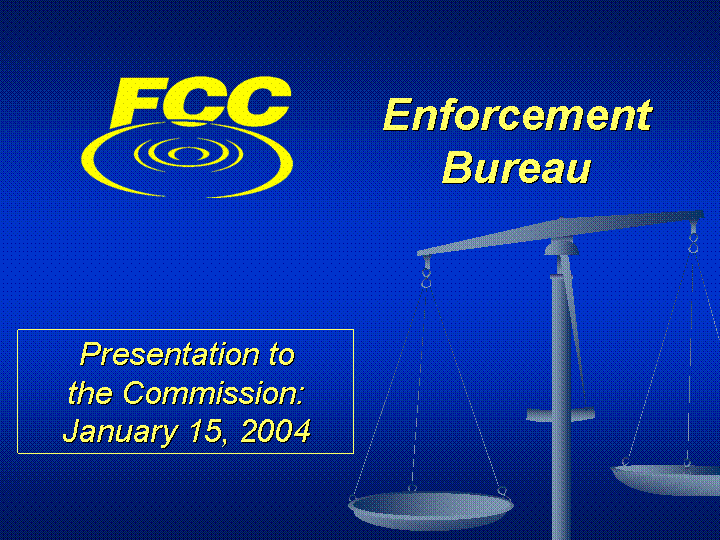
Good morning.
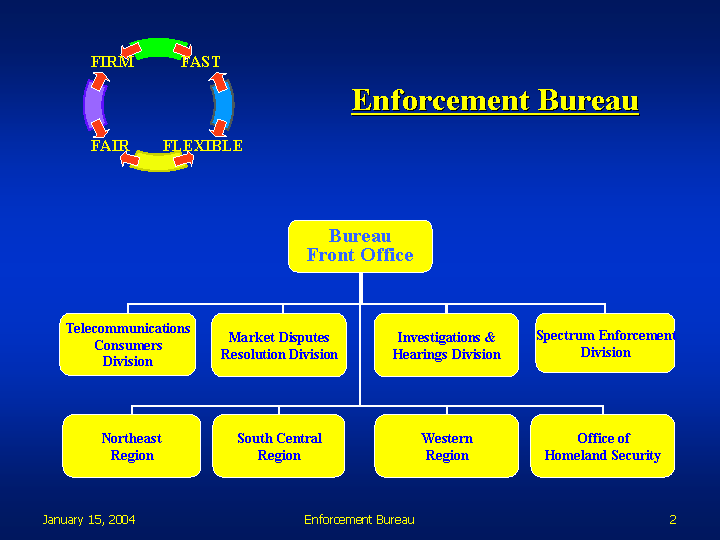
On behalf of the 330 highly talented and productive employees of
the Enforcement Bureau, I'm pleased to report on our achievements
during the past year and our goals for the coming year.
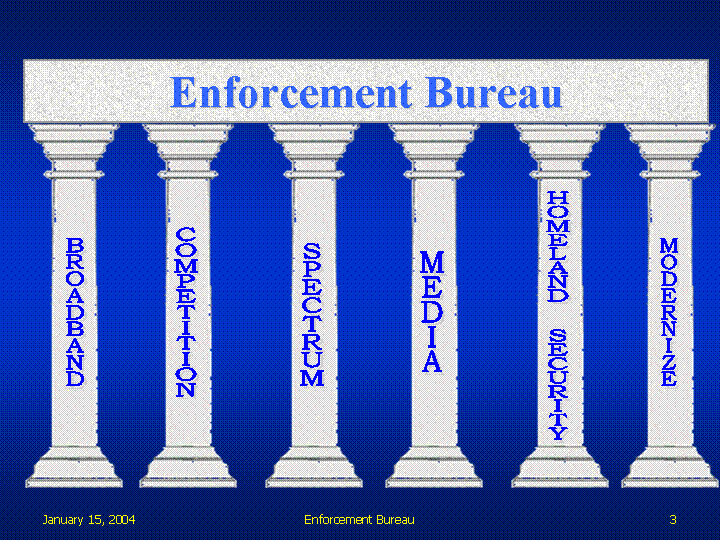
The Enforcement Bureau has made major contributions to all six of
the Commission's strategic goals.
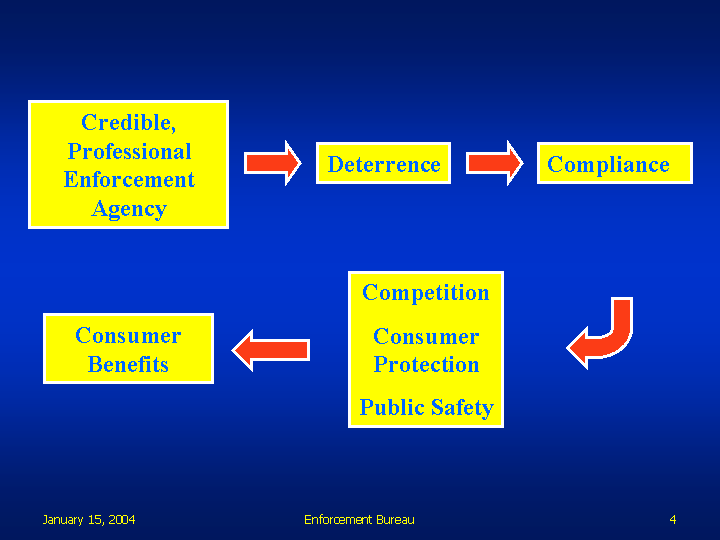
Everything we do in EB is aimed at serving American consumers.
Using enforcement to ensure that consumers reap public interest
benefits intended by Congress and the Commission is not just a
theoretical concept. Recently, for example, we stepped up our
enforcement against companies that owe money to the universal service
fund. We issued a proposed forfeiture of over $800,000 against one
seriously delinquent company, by far the largest enforcement action
ever in this area. This action prompted an increase in payments to the
fund, which in turn allowed the Commission to lower the contribution
factor, resulting in savings to consumers.
Underlying this kind of impact on consumers is the fact that, in
2003, we took almost 900 enforcement actions, ranging from citations
and admonishments to very significant forfeiture orders and revocation.
In monetary terms, we ordered, proposed or agreed to payments to the
Treasury or damages to competitors of close to $45 million. I should
note, however, that the absence of enforcement in certain areas can
also be a sign of success in that it shows companies are complying.
II. Broadband/Competition Enforcement
In the competition and broadband areas, we took a number of actions
last year to protect consumers and to enforce the market-opening
requirements of the Act.
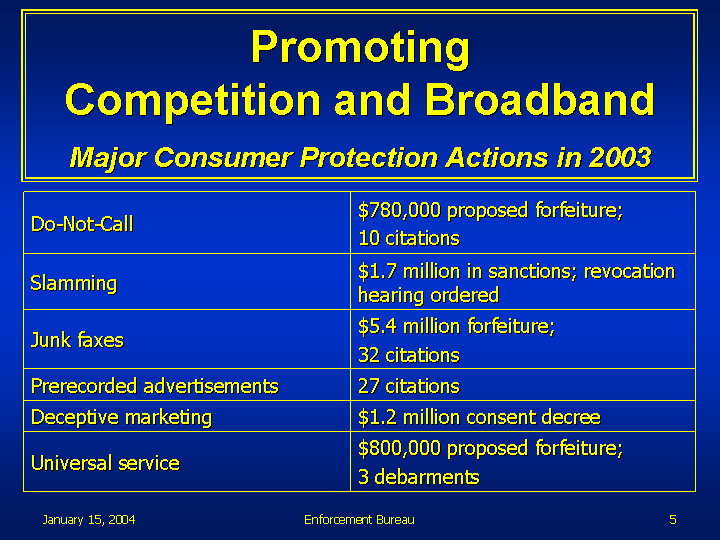
Our number one consumer protection enforcement priority is the
Commission's Do-Not-Call rules. Accordingly, we created a special
Do-Not-Call Enforcement Team within our Telecommunications Consumers
Division. As the Commission demonstrated with its proposed forfeiture
involving the company-specific Do-Not-Call rules, it is prepared to
take strong enforcement action in this area to ensure compliance. Last
month, we took our first enforcement actions under the new National
Do-Not-Call rules - five citations - and several investigations are
pending.
We also took major actions in other consumer protection areas,
including junk faxes, slamming and deceptive marketing, and
successfully assisted the parties in settling the first formal section
255 disabilities complaint.
In the universal service area, in addition to our stepped-up
enforcement regarding non-payment, we also began selected audits on
other issues and took action under the new debarment rules.
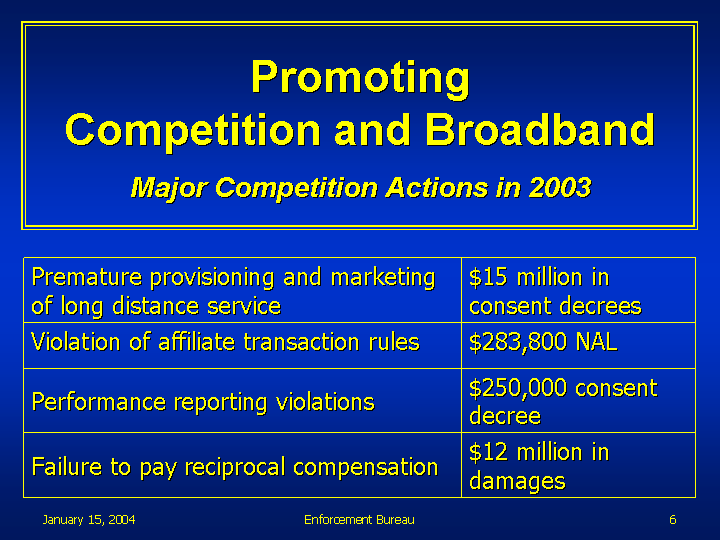
Turning to our market-opening actions, which promote efficiency,
economic growth and investment, the Commission decided several formal
complaint cases enforcing the local competition rules, one of which led
to the award of $12 million in damages to a CLEC. Importantly, the
Commission reaffirmed its jurisdiction, along with states, to interpret
and enforce interconnection agreements and the market-opening
requirements of the 1996 Act. Our Market Disputes Resolution Division
also continued its mediation program, which resulted in settlements in
more than half of the relevant cases.
We also entered into a series of consent decrees with each of the
Bell Operating Companies - totaling $15 million - regarding issues of
premature marketing and/or provisioning of long distance service under
section 271 of the Act. We also actively implemented our structured
section 271 compliance review program within our Investigations and
Hearings Division.
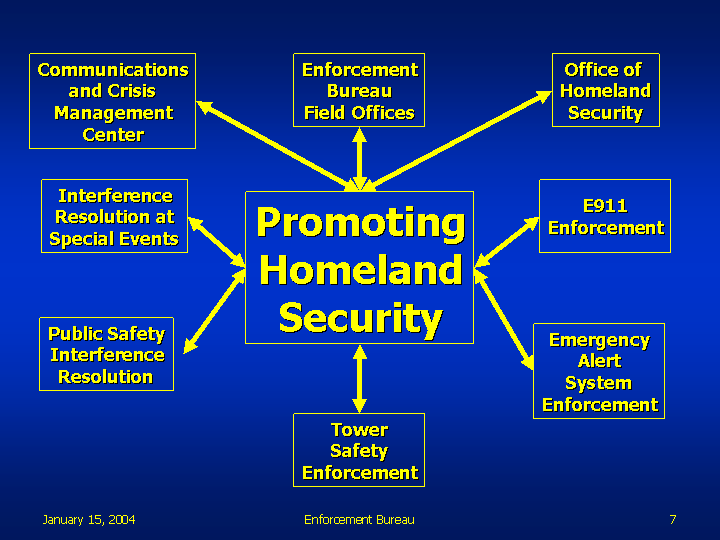
III. Homeland Security
Turning to homeland security, our new Office of Homeland Security has
been coordinating with over 50 government and private sector entities.
We also run the Commission's 24/7 Communications and Crisis Management
Center.
Our field offices have been involved in productive homeland
security partnerships, for example, with the Department of Homeland
Security on border interference issues and with a broader inter-agency
homeland security technical task force.
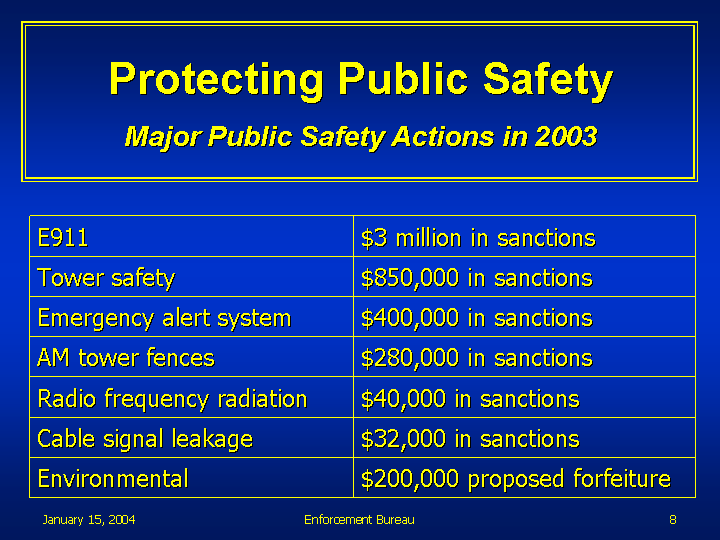
Many of our public safety enforcement actions also have important
homeland security implications. During the past year, for example, the
Commission took about $3 million in E911 enforcement action. Strong
enforcement has resulted in prompter E911 compliance. These rules save
lives and EB is proud of its part in making the Commission's E911
program work. We have also actively enforced in such public safety
areas as the Emergency Alert System, tower safety, RF radiation and
cable signal leakage.
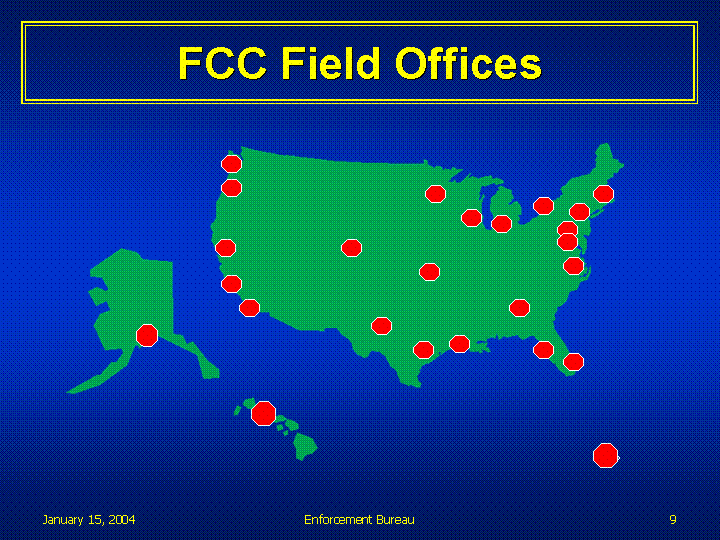
Through our field offices, we have also assisted law enforcement
and emergency service agencies in ensuring that they can communicate in
times of crisis. During the San Diego wildfires, for example, we
assisted the Forest Service in finding additional frequencies when
their helicopter and portable ground radio systems were overloaded. In
Seattle, we investigated and resolved interference between an emergency
room and medical helicopters. Our resolution of interference to Air
Force control tower frequencies in one case led to an e-mail telling us
that the interference was now ``deader than Millard Fillmore.''
We also used our expertise in finding and resolving harmful
interference at certain public events where public safety agencies
request our presence, for example, the Free Trade Area of the Americas
conference in Miami. We will be providing similar assistance at the
two political conventions this summer.
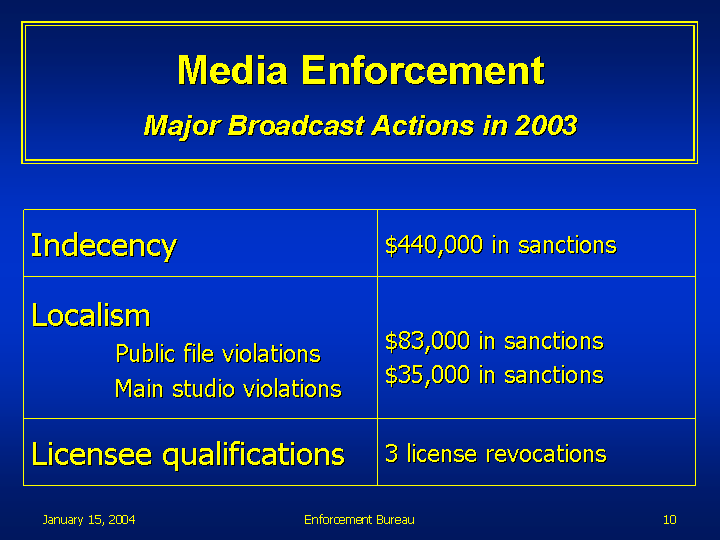
IV. Media
In the media enforcement area, the Commission has stepped up its
indecency enforcement. The Commission proposed forfeitures in three
cases at the statutory maximum, including one for more than $350,000.
The more than $600,000 in indecency enforcement in the last three years
is about four times the level of enforcement during the prior three
years. We have several other significant NALs in the pipeline.
In support of the Commission's localism initiative, during 2003, we
took over $100,000 in actions enforcing the main studio and public file
rules. We are also in the process of reviewing the results of a field
audit of compliance by broadcasters and cable operators with the
children's television commercial limits.
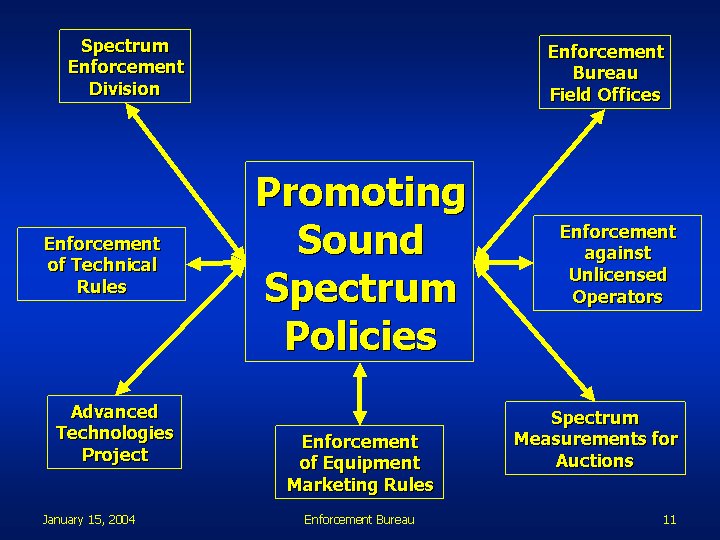
V. Spectrum
Through our 25 Field offices as well as our Spectrum Enforcement
Division, the Enforcement Bureau is the spectrum cop on the beat. In
addition to the spectrum-related public safety and homeland security
work I already mentioned, of particular note is the fact that last
year, through a variety of techniques, we shut down close to 300 pirate
radio stations. We also started giving higher priority to complaints
involving manufacturing and marketing of unlawful equipment, often
imported from abroad. Such unlawful equipment marketing can cause
interference, constitute unfair competition and cost American workers
their jobs.
On a separate front, we supported WTB's auctions work through our
upper spectrum monitoring project, focused on identifying unencumbered
spectrum. We also inaugurated an advanced technologies team to enhance
our capability to identify and locate digital and complex signals. We
are also partnering with the Army to evaluate the use of Time
Difference of Arrival technology (or TDOA) to locate radio
transmissions.
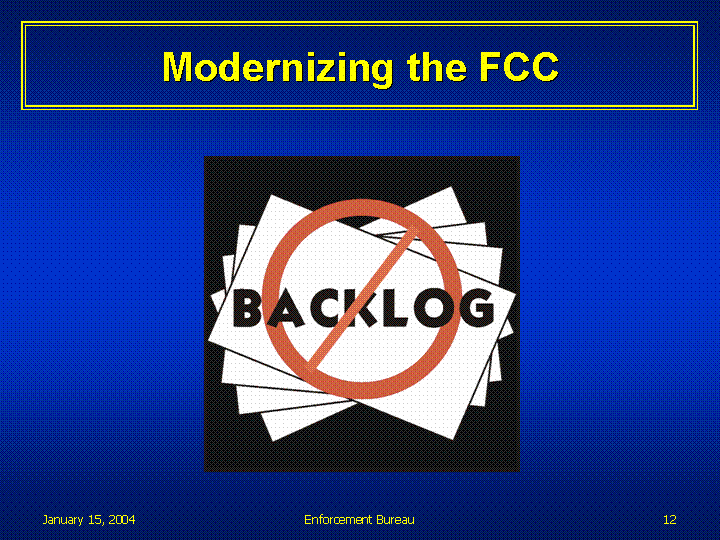
VI. Modernizing the FCC
In terms of modernizing the FCC, we are very proud that the Enforcement
Bureau was the first recipient of the Chairman's ``Backlog Busters''
award. We have only three Commission-level cases pending in EB that
are more than a year old and all of those will go to the 8th Floor in
the next month or two. We hope to increase even more the speed of our
decision-making in the coming year.
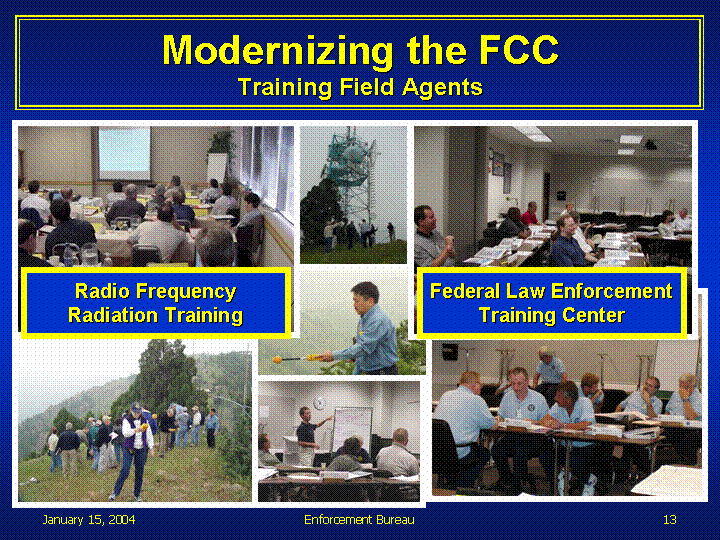
The Enforcement Bureau has taken great advantage of the FCC
University and a multitude of other training opportunities. Over 90
percent of our staff took, in total, about 1000 courses in 2003,
enhancing skills in such areas as new technologies, safety, mediation,
auditing, management and leadership. Our Knowledge Sharing Program
included engineers from OET, WTB and the Media Bureau spending time in
the Field with EB agents working on RF radiation and public safety
issues. We also had additional training this year at the Federal Law
Enforcement Training Center.
We have also been able to upgrade significantly the technical
infrastructure necessary for our Field mission. For example, we made
investments in new and improved mobile direction finding vehicles and
associated digital receivers, RF radiation meters, spectrum analyzers
and field intensity meters.
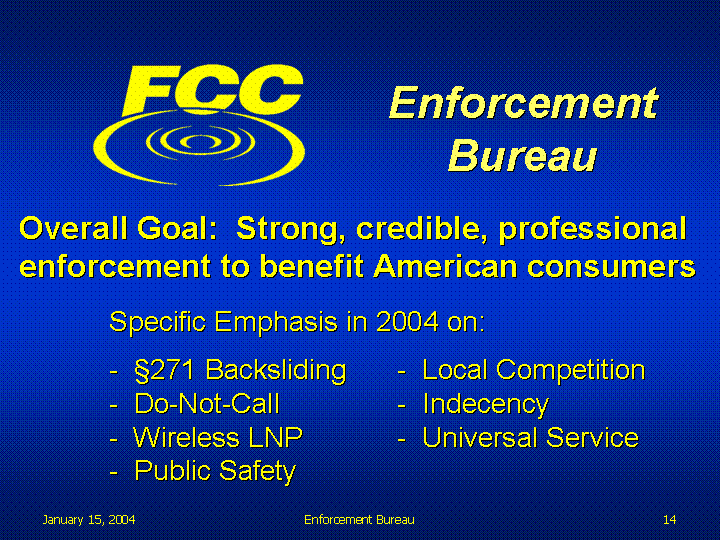
VII. Goals for 2004
Looking ahead to next year, we aim to stay focused on sustaining a
strong FCC enforcement presence devoted to the interests of American
consumers. We expect to be particularly active on Do-Not-Call,
indecency, local number portability, universal service, public safety
and section 271 and other local competition enforcement.
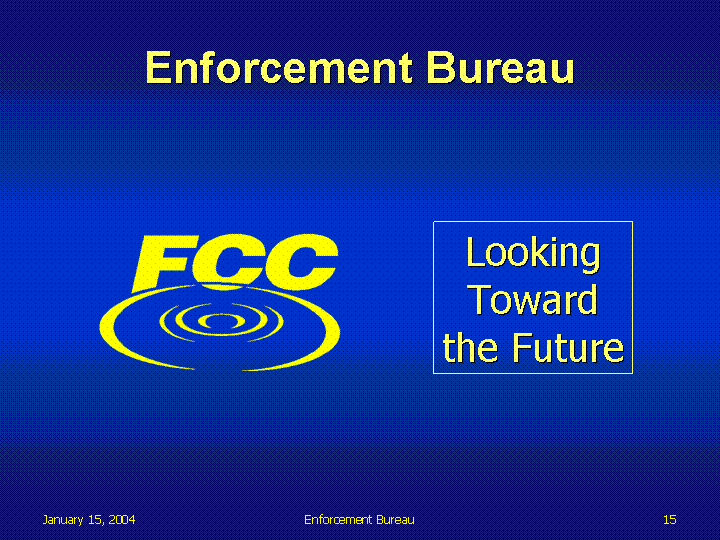
I want to close by thanking you, Mr. Chairman, and all of the
Commissioners, for your strong leadership on enforcement. With that
leadership, and hard work by EB's talented staff, I am confident that
the Commission's enforcement program will continue to do great things
for American consumers.
|

